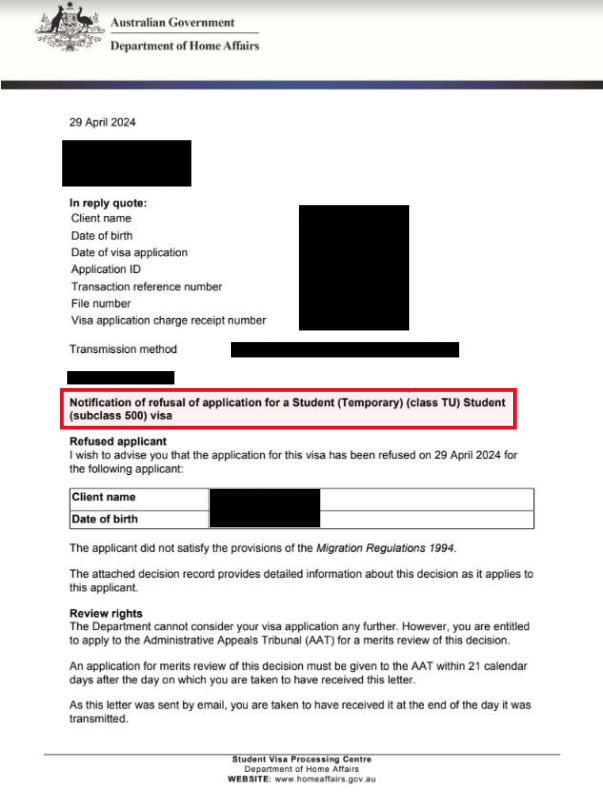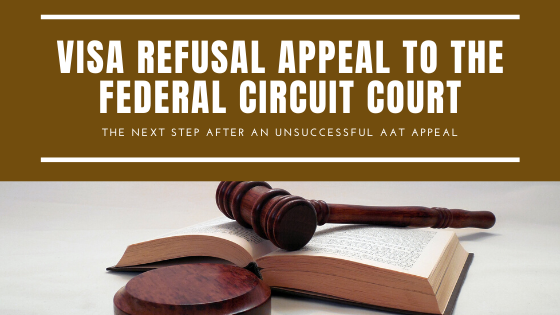We understand that having a visa refusal can be disappointing and you can feel quite stressed and unsure of what to do.
In this blog, we explain the appeal process and what you can do if your visa has been refused by the Department of Home Affairs.
Generally, you have the option to appeal the decision through a merits review or judicial review. The process for appealing a visa refusal can vary depending on the type of visa you applied for, and the specific circumstances of your case.

Merits Review
Basically, merits review is a process that allows a decision maker to ‘step into the shoes’ of the original decision maker for example the delegate at the Department and make a fresh decision based on the evidence before it. In Australia, this is usually undertaken by a body known as the Administrative Appeals Tribunal (or the AAT).
Appealing the decision at the AAT
The refusal letter will state whether you can appeal the decision at the AAT. If you have this option, you must make sure to lodge your appeal within the time frame that is provided in your refusal letter. The easiest way to lodge your appeal is online through the AAT’s website.
Once you lodge an appeal at the AAT, your bridging visa will continue until you get a decision on your appeal.
Attending a Hearing
The AAT will then review your appeal application. Due to a large number of applications, it usually takes a long time before you are invited for a hearing. At the hearing, you can present your case and any evidence to support your appeal. The AAT will then usually make a decision to affirm the Department’s decision to refuse your visa or remit the decision back to the Department for reconsideration.
We would recommend getting legal assistance from an Australian Migration Lawyer to avoid any issues with your appeal and put your best case forward, especially when preparing for your hearing.
Judicial Review
In cases where you don’t have a merits review option, you may be able to appeal the refusal decision in court.
Unlike merits review, judicial review does not involve considering the merits of the case or deciding what the right decision was. Instead, it looks at the process through which a decision was made and determine if it was made in accordance with the law.
Another thing to keep in mind is that unlike an appeal to the AAT, your bridging visa does not automatically continue when you apply for judicial review. You will need to lodge a bridging visa application before your current visa expires. We’re here to help if you need any assistance with this.
Appealing the decision in court
To be able to appeal the decision in court, you need to have grounds to seek judicial review for example there was a legal error in the decision-making process, such as a breach of procedural fairness or an incorrect interpretation of the law. You may need to get a Barrister to look at your case and assess if there are any grounds for judicial review.

Filing an appeal application
To begin an appeal at court, you will need to file an application with the Federal Circuit and Family Court of Australia and within the specified time, which is generally 35 days from the date of the refusal.
After this you will need to follow the court procedures by serving the documents to the other party within the specified time, and then go through the court proceedings by attending a hearing and waiting for the court’s decision. This process can be very long, and it can take several years before you have a hearing.
It's important that you comply with all the requirements and deadlines for filing a court application and serving the documents as required by the court.
It can be helpful to get legal advice from a migration lawyer to help you navigate your appeal process because I understand it can be very confusing and there are strict time frames you have to work with.
Do you need help with your refused visa application?
Our team of experienced Immigration Lawyers and Migration Agents look forward to assisting you with your appeal application.
If you have a Student Visa refusal, a Partner Visa refusal, a 482 Employer-sponsor Visa refusal, a 407 Training Visa refusal, a Graduate Visa refusal, a 491 Visa refusal, a 190 Visa refusal or any other visa refusal, we can assist you.
Based in Adelaide, South Australia, we provide Australian immigration advice to people and businesses from all over the world.
You can book an appointment online or call us at (+61) 8 8351 9956.









